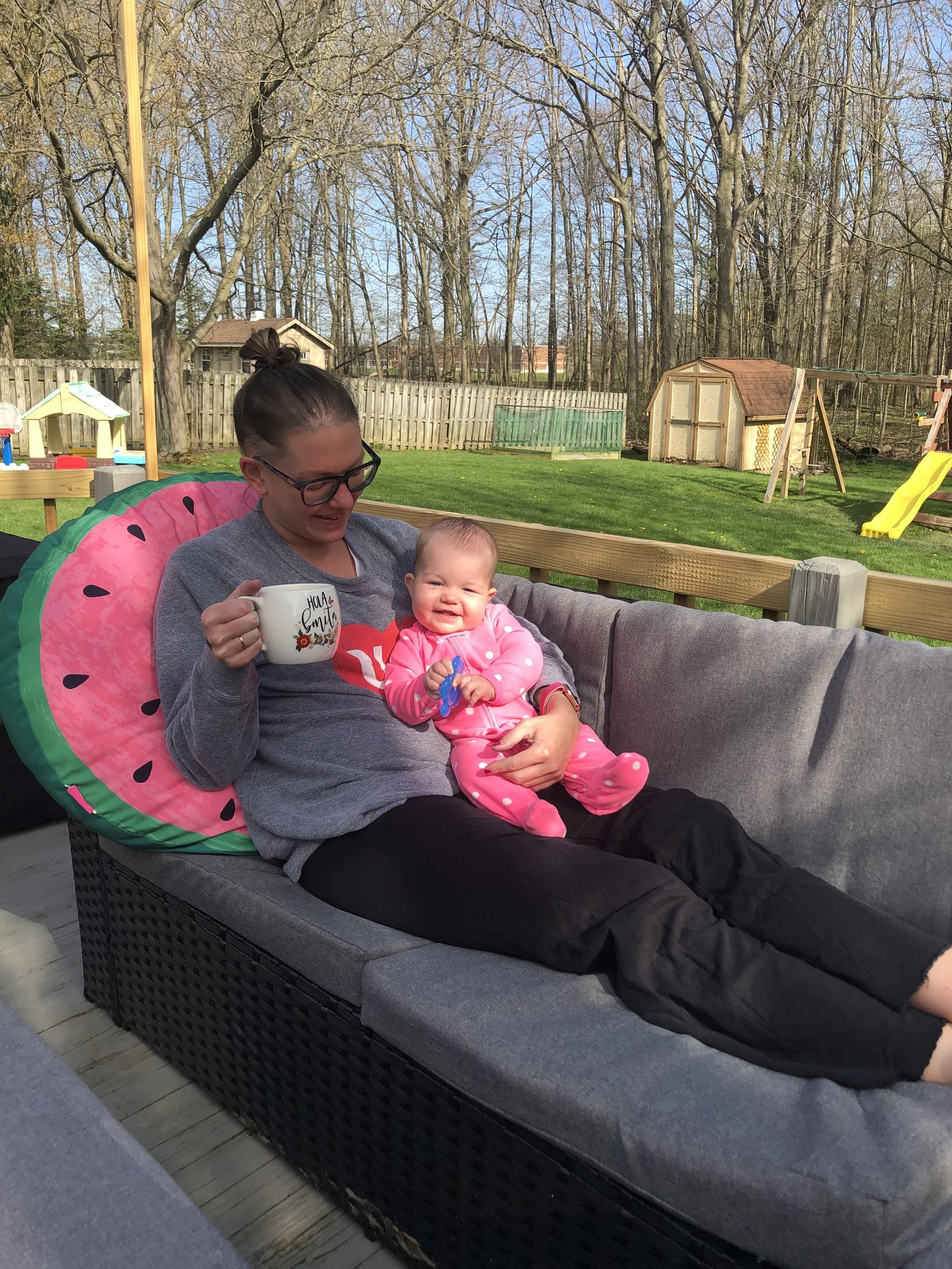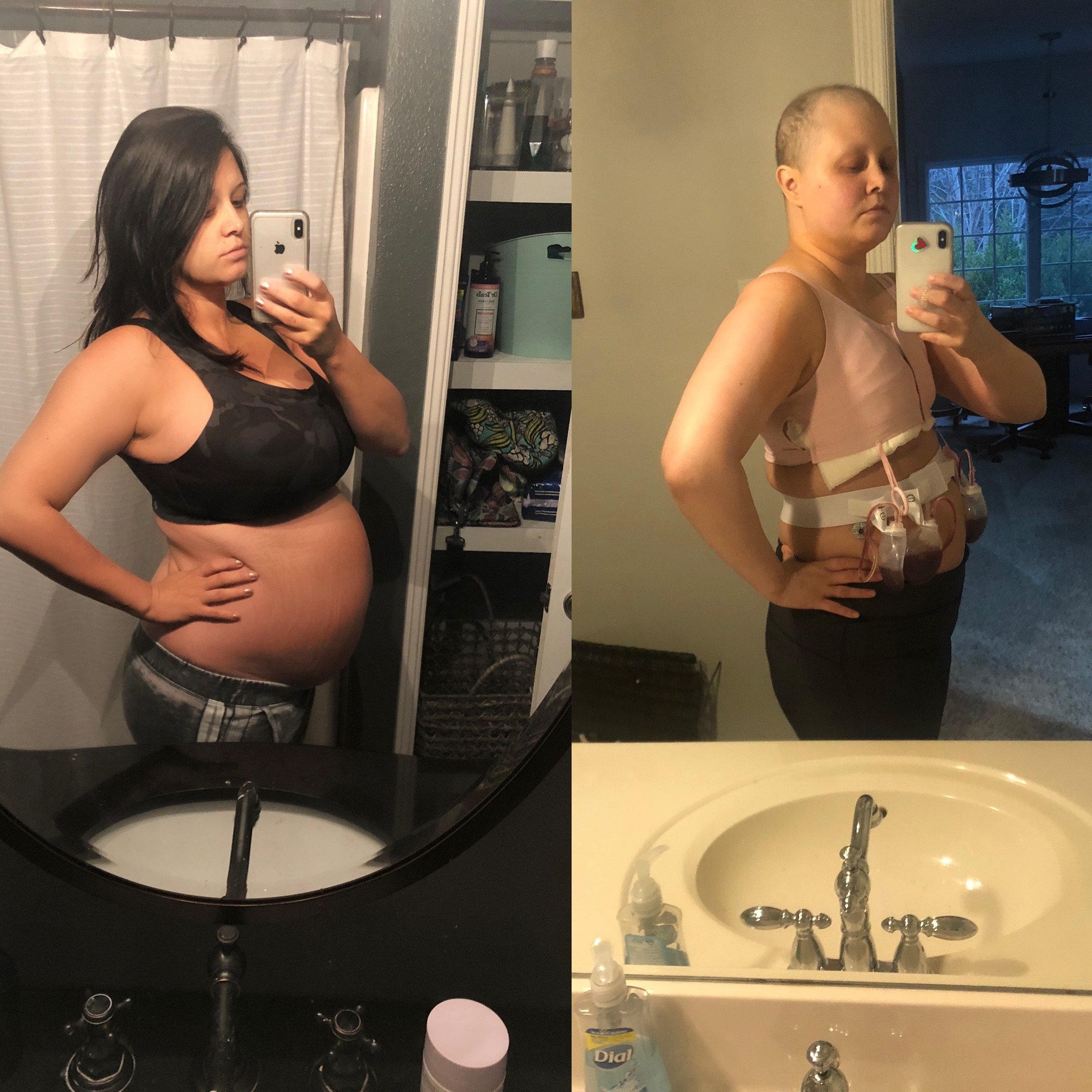Navigating Active Cancer Treatment with a Newborn
This post was compiled by our Love Bombs committee members who tackled chemotherapy head on while also caring for newborns and small children. This post is for educational purposes only and is not considered medical advice.Port access and a newborn is not the Netflix and chill we hope for, and as it turns out, we’ve yet to see a “managing your chemo treatment during postpartum recovery” in the pamphlet section of our respective cancer treatment centers.
Bottom line: chemo and your newborn don’t mix. While chemotherapy kills cancer cells, it also kills normal cells, which means you’ll need to keep your fresh baby away from your bodily fluids when chemo is coursing through it.
Chemotherapy
Chemotherapy drugs are hazardous and can cause harm to people who handle them or come into contact with them. There is generally little risk to others during chemotherapy treatment as long as they don’t come in contact with any chemotherapy drugs or body fluids. It takes about 48 to 72 hours for your body to break down and/or get rid of most chemotherapy drugs. A few things to keep in mind:
Breastfeeding isn’t advised. You’re going to feel a lot of feelings about this not being your decision. Fed is best. Alive mom is best. Your baby deserves a mom, and that’s why you’re doing this.
Hot flashes during chemo, and during postpartum, are real, which means you may need to shower off chemo sweat before picking up a newborn or small child.
Use a toilet children don’t use, or flush twice after use making sure to shut the lid before flushing.
Don’t share drinking cups.
Keep oral chemotherapy drugs in a locked location and follow all Rx directions.
Rifka Coleman
When I was diagnosed with breast cancer and my 19 month old baby was still nursing, it was incredibly painful to quit breastfeeding abruptly. There was not opportunity to wean, which caused me physical discomfort, but both of us emotional distress.
This photo captures on of the last times breastfeeding from Rifka’s unaffected right breast. She had to immediately stop feeding from her left breast, but was able to nurse until her scans later that week. You can see the engorged left side, which was very uncomfortable for Rifka.
Imaging Scans
Scans requiring radiation will likely require quarantining from children and pregnant women. For example:
A MUGA scan is a nuclear imaging test that uses a radiotracer. MUGA scans may give your doctor a more precise ejection fraction reading.
A positron emission tomography (PET) scan is an imaging test that can help reveal the metabolic or biochemical function of your tissues and organs, which uses a radioactive drug called a tracer to show both typical and atypical metabolic activity. A PET scan can often detect the atypical metabolism of the tracer in diseases before the disease shows up on other imaging tests, such as computerized tomography (CT) and magnetic resonance imaging (MRI).
Kate Williams
I was 37 years old and my kids were 8, 5, and 9 weeks when I diagnosed with Triple Negative Breast Cancer while on a family vacation in Disney World.
Tackling cancer is a full-time job on top of the full-time jobs of business ownership and a a family.
Slow down and be gentle with yourself. Let your friends give the baby a bath and do the laundry. For god’s sake, no one needs to fold onesies recovery from chemo.
Ask for help, always.
Surgery
Surgery is wild. You’re a T-rex with drains, which means you’re not lifting, pushing, or pulling for around four weeks. Read as: you’re going to need help with your baby.
Plan to not be the primary parent for a few weeks. Ask for help. Even if you don’t want to. Especially if you believe you have it under control.
The people in your life have been itching to find a way to help you, this is a good time to take them up on the offer.
Brooke Taylor
There are 7 months and a C-section, IV chemo, port placement, 2 surgeries to clean out a staph infection, a wild case of the shingles, and a mastectomy between these two images.
I could not have continued to serve the clients of my boutique strategic communications agency, raise a newborn, and give that jackwagon cancer the what-for if I didn’t ask for help.
This is not the time to be a hero.
Therapy
If you remove cancer from the equation it’s important to remember: you just had a baby.
That alone is a large feat. In fact, in the present day, women are still dying as a result of complications during and following pregnancy and childbirth at a high rate.
Again, you just had a baby and that in and of itself is miraculous and beautiful and traumatic.
You are tackling so, so much. A really good therapist or psychiatrist can help you navigate the wild wild west that is slaying the beast that is cancer.
How to find a therapist or psychiatrist:
Consult your insurance directory
Ask your oncologist or nurse navigator
Ask your local network
It takes at least 18 months to recover from childbirth, which means, for example, if you’re tackling the traditional breast cancer treatment buffet it’s entirely possible you’ll be done with traditional treatment (IV chemo, surgery, radiation) before your womb is done healing from growing a human from scratch.
“The bottom line is she won’t remember and I won’t forget.”



